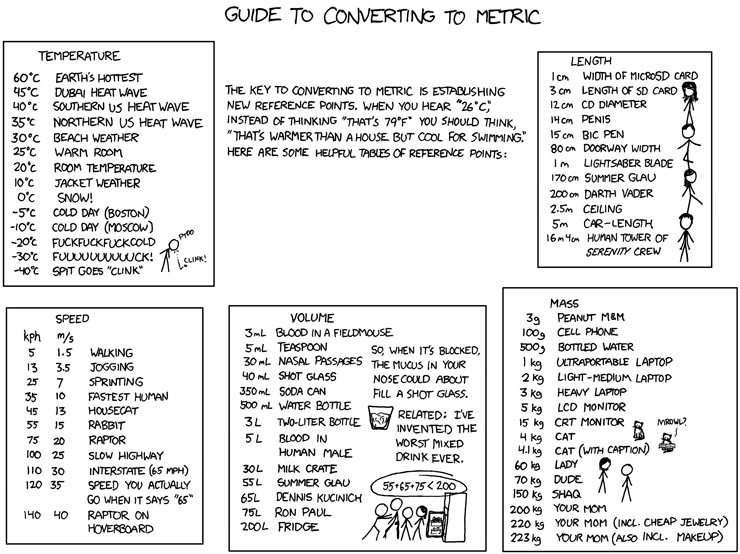Since nobody brought this up yet, here is something for you US/customary/British/imperial unit users out there:For everyday use, there's not really a significant advantage over using either customary units and metric units. I have learned both and use both on a daily basis. That being said, I do agree that metric is generally easier to use for scientific and engineering purposes. SI is even better. Honestly, one of the big reasons that I switched from being a petroleum engineering major to an aerospace engineering major was the awful unit conversions and the need to memorize lots of conversion constants like between cubic feet and gallons. In my opinion, metric is a better system overall, even if you do lose some historical flavor. I don't see the US fully committing to the metric system anytime within the next several decades because if there's one country that's averse to short-term pain, it's the US.
It's nice that water freezes and boils at respectively 0 and 100 °C, and it's nice that a liter of water has a mass of kilogram. Sure, a pound is a unit of both pound and mass, but that causes ambiguities and other problems since the acceleration of gravity is not normalized to 1. Degrees Fahrenheit is more precise than degrees Celcius, but realistically a human is not likely to be able to estimate temperature with that kind of precision anyway. Not that metric or even SI is perfect. The whole second-minute-hour situation is an obvious inconsistency with the otherwise nice and easy factors of ten. These factors of 60 are also in angle measurements (degrees, minutes, seconds) and are kinda clunky at times, though miliradians and microradians are often used to measure really small angles.
P.S. As for SI, it is a bit silly how the kilogram is the base unit rather than the gram (millikilogram?). It's probably too much effort to get everyone to call a kilogram something else. Then again, maybe that could come with redefining the "kilogram" to be based off of fundamental constants rather than the mass of some chunk of metal in France. And nobody talks of kiloseconds or higher anyway.


